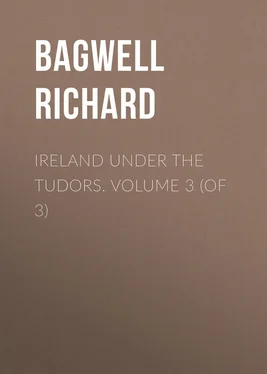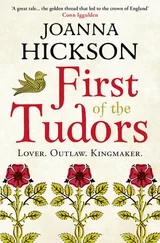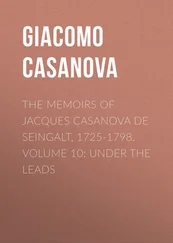Richard Bagwell - Ireland under the Tudors. Volume 3 (of 3)
Здесь есть возможность читать онлайн «Richard Bagwell - Ireland under the Tudors. Volume 3 (of 3)» — ознакомительный отрывок электронной книги совершенно бесплатно, а после прочтения отрывка купить полную версию. В некоторых случаях можно слушать аудио, скачать через торрент в формате fb2 и присутствует краткое содержание. Жанр: foreign_antique, foreign_prose, на английском языке. Описание произведения, (предисловие) а так же отзывы посетителей доступны на портале библиотеки ЛибКат.
- Название:Ireland under the Tudors. Volume 3 (of 3)
- Автор:
- Жанр:
- Год:неизвестен
- ISBN:нет данных
- Рейтинг книги:3 / 5. Голосов: 1
-
Избранное:Добавить в избранное
- Отзывы:
-
Ваша оценка:
- 60
- 1
- 2
- 3
- 4
- 5
Ireland under the Tudors. Volume 3 (of 3): краткое содержание, описание и аннотация
Предлагаем к чтению аннотацию, описание, краткое содержание или предисловие (зависит от того, что написал сам автор книги «Ireland under the Tudors. Volume 3 (of 3)»). Если вы не нашли необходимую информацию о книге — напишите в комментариях, мы постараемся отыскать её.
Ireland under the Tudors. Volume 3 (of 3) — читать онлайн ознакомительный отрывок
Ниже представлен текст книги, разбитый по страницам. Система сохранения места последней прочитанной страницы, позволяет с удобством читать онлайн бесплатно книгу «Ireland under the Tudors. Volume 3 (of 3)», без необходимости каждый раз заново искать на чём Вы остановились. Поставьте закладку, и сможете в любой момент перейти на страницу, на которой закончили чтение.
Интервал:
Закладка:
After Stukeley’s death James Fitzmaurice continued to prepare for a descent on Ireland. After his return from Rome he went to France, where he joined his wife, son, and two daughters. He then spent nearly three months at Madrid with Sanders, and obtained 1,000 ducats for his wife, who was then in actual penury at ‘Vidonia’ in Biscay. But he could not see the king, and professed himself indifferent to help from Spain or Portugal. ‘I care for no soldiers at all,’ he said to Sanders; ‘you and I are enough; therefore let me go, for I know the minds of the noblemen in Ireland.’ Some of Stukeley’s men, with a ship of about 400 tons, had survived the Barbary disaster. O’Mulrian, Papal Bishop of Killaloe, came to Lisbon from Rome with the same men and two smaller vessels, and by the Pope’s orders Stukeley’s ship was given to them. Sanders accompanied the bishop, and there seem to have been about 600 men – Italians, Spaniards, Portuguese, Flemings, Frenchmen, Irish, and a few English. It was arranged that this motley crew should join Fitzmaurice at Corunna, and then sail straight to Ireland. A Waterford merchant told his wife that the men were very reticent, but were reported to be about to establish the true religion. When questioned they said they were bound for Africa, but the Waterford man thought they were going to spoil her Majesty’s subjects. Meanwhile Fitzmaurice was at Bilbao with a few light craft. The largest was of sixty tons, commanded by a Dingle man who knew the Irish coast, but who ultimately took no part in the expedition. William Roche, who had been Perrott’s master gunner at Castlemaine, and James Den of Galway, were also retained as pilots. A little later Fitzmaurice had a ship of 300 tons, for which he gave 800 crowns, several small pieces of artillery, 6,000 muskets, and a good supply of provisions and trenching tools. The men received two months’ pay in advance.
Fitzmaurice’s one idea was to raise an army in Munster, and he told an Irish merchant who thought his preparations quite inadequate, that ‘when the arms were occupied’ he made no account of all the Queen’s forces in Ireland. He was accompanied by his wife and daughter and about fifty men, who were nearly all Spaniards. Sanders went to Bilbao after a short stay at Lisbon, and two merchants, one of Waterford and one of Wexford, who came together from the Tagus to the Shannon, reported that a descent was imminent. ‘The men,’ they said, ‘be willing; they want no treasure, they lack no furniture, and they have skilful leaders.’ To oppose a landing the Queen had one disabled ship in Ireland, and there were no means of fitting her out for sea. 10 10 Patrick Lumbarde to his wife (from Lisbon) Feb. 20, 1579; Nic. Walshe to Drury, Feb. 27; Declaration of James Fagan and Leonard Sutton, March 23; Drury to Walsingham, March 6; Desmond to Drury, April 20; Examination of Dominick Creagh, April 22, and of Thomas Monvell of Kinsale, mariner, April 30.
The French rover, De la Roche, in spite of Catherine de Medici’s assurance, seems to have co-operated with Fitzmaurice. John Picot, of Jersey, bound for Waterford with Spanish wine, was warned at San Lucar by a Brest man that De la Roche and Fitzmaurice spoiled everyone they met. To avoid them Picot kept wide of the coast; nevertheless he fell in with eight sail 60 leagues N.W. of Cape St. Vincent. They fired and obliged him to lower a boat, and then robbed him of wine, oil, raisins, and other things of Spain. Picot saw twelve pieces of cannon in De la Roche’s hold, but was warned significantly not to pry under hatches again. The Jerseymen were beaten, the St. Malo men spared, and all were told, with ‘vehement oaths and gnashing of teeth,’ that if they had been Englishmen they would have been thrown overboard – a fate which actually befell the crew of a Bristol vessel two or three days later. Finding that Picot was going to Ireland, his captors said they would keep company with him; but thick weather came on, and by changing his course, he got clear within twenty-four hours. A few days after Fitzmaurice was in Dursey Sound with six ships, and others were sighted off Baltimore. He picked up a fisherman and bade him fetch in Owen O’Sullivan Bere, but that chief refused, and three days later the invading squadron cast anchor off Dingle. 11 11 July 17, 1579. Examination (at Waterford) of John Picot of Jersey, master, and Fr. Gyrard, of St. Malo, pilot, July 24; Lord Justice and Council to the Privy Council, July 22; Sir Owen O’Sullivan to Mayor of Cork, July 16; Portreeve of Dingle to Earl of Desmond, July 17. The story of the Bristol crew is told in Mr. Froude’s 27th chapter, ‘from a Simancas MS.’
The portreeve and his brethren went off to speak with the strangers next morning. Some Spaniards whom they knew refused to let them come on board, and they sent at once to Desmond for help. The preparations for resistance were of the slightest. The constable of Castlemaine reported that he had only five hogsheads of wheat, two tuns of wine, three hogsheads of salmon, and some malt; and that he was dependent for meat upon such bruised reeds as Desmond and Clancare. There were neither men nor stores at Dublin, and no hope of borrowing even 500 l. Cork had but five barrels of inferior powder, and no lead. At Waterford there were only 2,000 pounds of powder. All that Drury could do was to write letters charging the Munster lords to withstand the traitors, but a fortnight passed before he himself could get as far as Limerick. 12 12 Lord Justice and Council to the Privy Council with enclosure, July 22, 1579; Waterhouse to Walsingham, July 23 and 26; Mayor of Waterford to Drury, July 25.
Mr. James Golde, Attorney-General for Munster, writing from Tralee, thus describes the manner of Fitzmaurice’s landing, which took place on the day after his arrival at Dingle: —
‘The traitor upon Saturday last came out of his ship. Two friars were his ancient-bearers, and they went before with two ancients. A bishop, with a crozier-staff and his mitre, was next the friars. After came the traitor himself at the head of his company, about 100, and went to seek for flesh and kine, which they found, and so returned to his ships.’ 13 13 James Golde to the Mayor of Limerick, July 22, 1579.
On the same day they burned the town, lit fires on the hills as if signalling to some expected allies, and then shifted their berths to Smerwick harbour, taking with them as prisoners some of the chief inhabitants of Dingle. At Smerwick they began to construct a fort, of which the later history is famous. It was believed that Fitzmaurice expected immediate help out of Connaught. ‘Ulick Burke is obedient,’ said Waterhouse; ‘but I believe that John will presently face the confederacy.’ Drury could only preach fidelity, and commission Sir Humphrey Gilbert to take up ships and prosecute the enemy by sea and land. 14 14 Desmond, abp. of Cashel (Magrath), and Wm. Apsley to Drury, July 20, 1579; Waterhouse to Walsingham, July 23 and 24; Commission to Sir H. Gilbert, July 24; James Golde to the Mayor of Limerick, July 22.
Fitzmaurice brought to Ireland two printed proclamations – one in English for those who spoke it and were attached to the English crown, the other in Latin for the Irish and their priests.
The first paper sets forth that Gregory XIII. ‘perceiving what dishonour to God and his Saints, &c… hath fallen to Scotland, France, and Flanders, by the procurement of Elizabeth, the pretensed Queen of England; perceiving also that neither the warning of other Catholic princes and good Christians, nor the sentence of Pope Pius V., his predecessor, nor the long sufferance of God, could make her to forsake her schism, heresy, and wicked attempts; now purposeth (not without the consent of other Catholic potentates) to deprive her actually of the unjust possession of these kingdoms, &c.’ Any attack on the Crown of England is disclaimed; the usurper was alone aimed at, and the help of the English Catholics was considered certain. The Catholics were everywhere, but ‘Wales, Chestershire, Lancastershire, and Cumberland’ were entirely devoted to the old faith, and their proximity to Ireland increased their importance. Throughout England the husbandmen – the raw material of every army – were ‘commonly all Catholics.’ Elizabeth had a few friends indeed, but she would be afraid to send them away from her, and if Ireland remained united, all must go well. One great crime of Queen Elizabeth was her refusal to declare an heir-apparent; by espousing the cause of that heir, whose name is not mentioned, the reward of those who worship the rising sun might fairly be expected. Fitzmaurice explained that the Pope had appointed him general because he alone had been present at Rome, but that he intended to act by the advice of the Irish prelates, princes, and lords, ‘whom he took in great part for his betters.’ And his appeal ends thus: ‘This one thing I will say, which I wish to be imprinted on all our hearts, if all we that are indeed of a good mind would openly and speedily pass our faith by resorting to his Holiness’ banner, and by commanding your people and countries to keep no other but the Catholic faith, and forthwith to expel all heresies and schismatical services, you should not only deliver your country from heresy and tyranny, but also do that most godly and noble act without any danger at all, because there is no foreign power that would or durst go about to assault so universal a consent of this country; being also backed and maintained by other foreign powers, as you see we are, and, God willing, shall be; but now if one of you stand still and look what the other doth, and thereby the ancient nobility do slack to come or send us (which God forbid), they surely that come first, and are in the next place of honour to the said nobility, must of necessity occupy the chief place in his Holiness’ army, as the safeguard thereof requireth, not meaning thereby to prejudice any nobleman in his own dominion or lands, which he otherwise rightfully possesseth, unless he be found to fight, or to aid them that do fight, against the Cross of Christ and his Holiness’ banner, for both which I, as well as all other Christians, ought to spend our blood and, for my part, intend at least by God’s grace, Whom I beseech to give you all, my lords, in this world courage and stoutness for the defence of His faith, and in the world to come life everlasting.’ 15 15 The signature is ‘In omni tribulatione spes mea Jesus et Maria, James Geraldyne.’
Интервал:
Закладка:
Похожие книги на «Ireland under the Tudors. Volume 3 (of 3)»
Представляем Вашему вниманию похожие книги на «Ireland under the Tudors. Volume 3 (of 3)» списком для выбора. Мы отобрали схожую по названию и смыслу литературу в надежде предоставить читателям больше вариантов отыскать новые, интересные, ещё непрочитанные произведения.
Обсуждение, отзывы о книге «Ireland under the Tudors. Volume 3 (of 3)» и просто собственные мнения читателей. Оставьте ваши комментарии, напишите, что Вы думаете о произведении, его смысле или главных героях. Укажите что конкретно понравилось, а что нет, и почему Вы так считаете.












